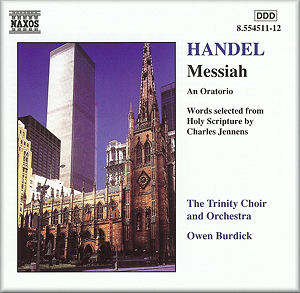 |
 |
|


alternatively
CD: Crotchet
Download: Classicsonline
|
George Frederick HANDEL (1685-1759)
Messiah (1741) [142:19]
 Bethany Hodges, Janine
Ullyette (soprano); Andrea Saposnik, Sarah Bleasdale, Robert Crowe
(alto); Benjamin Brecher (tenor); James Martin, Robert McLoud (bass) Bethany Hodges, Janine
Ullyette (soprano); Andrea Saposnik, Sarah Bleasdale, Robert Crowe
(alto); Benjamin Brecher (tenor); James Martin, Robert McLoud (bass)
Trinity Choir and Orchestra/Owen Burdick
rec. Trinity Church, Wall Street, New York, 5, 11-12 May 1996
Text included
 NAXOS 8.554511-12 [76:32 + 65:47] NAXOS 8.554511-12 [76:32 + 65:47] 
|
|
|
At a time when recordings of Messiah can be had in apparently
unending quantities and in every possible approach you may
be forgiven for wondering what is the point in a recording
which
lacks any obvious stars or exciting new approaches. That’s
leaving aside the fact that it has taken nearly fourteen years
from recording to issue in Britain. I should say straight away
that this is unlikely to be an obvious first choice if you
want only one version in your collection. However, if you are
prepared
to take it on its own terms its commanding merits nonetheless
make it very much worth hearing.
The performance is built around Trinity Church Choir, made
up of twenty-one professional singers, eight of whom are also
the
soloists in this performance. They are in every way technically
the equal of the many European professional choirs I have heard
in this work, and have, above all, a very appealing quality
of freshness. Having recently greatly enjoyed their recording
for
Naxos of all of Haydn’s Masses I was expecting that there
would be a dancing quality to their singing, and so there is.
The liner-notes point out with understandable pride that the
first performance of Messiah in the New World took place
in Trinity Church in October 1770. That said, it is worth pointing
out that it does seem to have taken some time to get there,
having been performed in many parts of provincial England in
the 1750s
and 1760s. It was indeed one of the first of Handel’s
oratorios to be performed in a church or cathedral rather than
a secular
venue. None of this is of great importance, however. What matters
is that Trinity Church Choir today - or at least in 1996 -
are obviously very much at home in the work and its idiom.
Any discussion of performances of Messiah has to start
with the text used, especially as the composer himself changed
this according to the circumstances of particular performances.
For this reason it has become fashionable to copy the text
used in specific performances given by the composer. This performance
does not do this, indeed the choice of text is basically that
once familiar from Ebenezer Prout’s edition, albeit without
his additional orchestration and (optional) cuts. Thus we have “But
who may abide” sung by a bass (James Martin) but in the
version that Handel wrote for alto, and the 4/4 version of “Rejoice
greatly” rather than the earlier, and to my mind much
more effective, version in 12/8. The only real surprise - shock,
even
- in the choice of edition comes at the start, where the first
section of the Overture is played very quietly by strings with
single dots, but repeated immediately loudly with oboes and
bassoon and with the double-dotting which most performers today
prefer.
Admittedly the choice of single or double dots is one that
still exercises scholars but to offer both in one performance
is unique
in my experience. I have to say, however, that it is very effective
in forcing the listener straightaway to listen critically not
only to what is being performed but why. Throughout choices
of tempo, articulation, decoration (of which there is plenty,
but
not enough to obscure the basic text) and instrumentation have
clearly been thought through with great care. I had no sense
that the performers were simply giving their standard performance
of a piece they know all too well. On the contrary, they give
the impression that everyone concerned was discovering the
work for the first time. As a result I, as listener, found
myself
doing the same.
That does not mean that everything is perfect. Although the
soloists are all at the very least adequate to the task and
avoid the
use of heavy vibrato, some are no more than that and lack the
kind of individuality that one expects from the soloists in
this work. The orchestra (19 are listed compared with 21 in
the choir)
play well if not always with great beauty of tone or phrasing.
Although players are listed for the harpsichord and organ,
and are indeed audible for much of the time on those instruments,
for some reason no audible continuo filling-in is included
in
some arias, such as “If God be for us”. This sounds
odd at first but is not ineffective and does make an effective
contrast with the busier texture of the choruses. Tempi are generally
well chosen although I did find the “Amen” excessively
slow.
As you will have gathered, this is not a recording that will
appeal to everyone or which is likely to displace established
favourites. Nonetheless I enjoyed listening to it immensely and
can imagine myself returning to it after hearing too many routine
performances of this work. It is intelligent, carefully thought-out
and full of rhythmic bounce and life - these are qualities you
should never take for granted in musical performance and which
are very welcome here.
John Sheppard
Masterwork Index: Messiah
|
|















